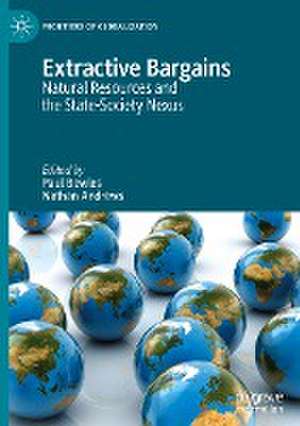Extractive Bargains: Natural Resources and the State-Society Nexus: Frontiers of Globalization
Editat de Paul Bowles, Nathan Andrewsen Limba Engleză Hardback – 26 sep 2023
The book will be of interest to students and researchers of global studies, global political economy, political science, political sociology, sustainability, environmental sociology, development studies and geography.
Chapter 1 is available open access under a Creative Commons Attribution 4.0 International License via link.springer.com.
Preț: 896.84 lei
Preț vechi: 1093.70 lei
-18% Nou
Puncte Express: 1345
Preț estimativ în valută:
171.66€ • 186.53$ • 144.29£
171.66€ • 186.53$ • 144.29£
Carte tipărită la comandă
Livrare economică 21 aprilie-05 mai
Preluare comenzi: 021 569.72.76
Specificații
ISBN-13: 9783031321719
ISBN-10: 3031321715
Ilustrații: XXIII, 361 p. 12 illus.
Dimensiuni: 148 x 210 mm
Greutate: 0.61 kg
Ediția:1st ed. 2023
Editura: Springer International Publishing
Colecția Palgrave Macmillan
Seria Frontiers of Globalization
Locul publicării:Cham, Switzerland
ISBN-10: 3031321715
Ilustrații: XXIII, 361 p. 12 illus.
Dimensiuni: 148 x 210 mm
Greutate: 0.61 kg
Ediția:1st ed. 2023
Editura: Springer International Publishing
Colecția Palgrave Macmillan
Seria Frontiers of Globalization
Locul publicării:Cham, Switzerland
Cuprins
Part I: Theorizing and Contextualizing Extractive Bargains.- Chapter 1:Extractive Bargains and the State-Society Nexus: One World, Many Bargains.- Chapter 2: From Extractivism to Sustainability: Scenarios and Lessons from Latin America.- Chapter 3: Extractive Bargains and Indigenous Peoples: A Comparative Perspective.- Part II: Global North Case Studies.- Chapter 4: The Legacy of Sweden’s Social Democratic State for Extractive Bargains with Indigenous Sami Reindeer Herding Communities.- Chapter 5: Extractive Settler Colonialism: Navigating Extractive Bargains on Indigenous Territories in Canada.- Chapter 6: Self-government and Resource Extraction in Greenland: From Independence to Diverse Bargains?.- Chapter 7: Keeping Oil in the Soil: National Bans on Oil Extraction as the Future of Global Climate Policy?.- Part III: Global South Case Studies.- Chapter 8: Extractive Policies in Mexico under López Obrador: Bargains for Whom?.- Chapter 9: Colombia: Contradictions of the Territorial Peace Extractive Bargain.- Chapter 10: Embedding Extractive Industries in Local Communities: The Chinese State’s Response to the Local Resource Curse.- Chapter 11: Creating a Gender-Sensitive Extractive Bargain in Tanzania through Local Content and Women’s Economic Empowerment.- Chapter 12: Contradictions of Privatized Developmentalist Bargains: Offshore Petroleum Extraction and Corporate Social Responsibility in Ghana.- Chapter 13: Extractive Bargains Reconciling Postcolonial Pluralism? Plural Economies in Bolivia and Ecuador.- Part: IV Beyond the National: Bargains at Other Scales.- Chapter 14: Global Extractive Bargains for Green New Deals.- Chapter 15: Conclusion: Debates and Extractive Bargains at Different Scales.
Notă biografică
Paul Bowles is Professor of Global and International Studies at the University of Northern British Columbia, Canada.
Nathan Andrews is Associate Professor in the Department of Political Science at McMaster University, Canada.
Textul de pe ultima copertă
“This impressive volume takes a deep dive into the ways states design and promote ‘extractive bargains’, exposing the search for a (post)extractive consensus within fluid state-society relations. A must-read on resource governance, supply security, and climate politics.”
—Philippe Le Billon, University of British Columbia and Institute for Advanced Study, Princeton
“The book makes a major contribution to the burgeoning study of extractivisms, and illustrates in detail how extractive bargains in the state-society nexus do not have a singular or predetermined outcome.”
“The book makes a major contribution to the burgeoning study of extractivisms, and illustrates in detail how extractive bargains in the state-society nexus do not have a singular or predetermined outcome.”
—Barry K. Gills, Professor of Global Development Studies, Helsinki University, Finland
“Through a collaborative methodology, Andrews, Bowles and volume contributors offer a conceptually innovative typology of the kinds of conditions that facilitate, normalize and constrict extractive activities within and between states … Highly recommended!”
—Anna Zalik, Associate Professor, Faculty of Environmental Studies, York University, Toronto, Canada
This book is the first to focus on state-led ‘extractive bargains,’ designed to reach a social consensus on the extent of extractive activities, how they should be governed and their negative consequences mitigated. These state-led ‘bargains’ have taken a number of different forms and offer varying degrees of promise in meeting environmental and social concerns. The book critically examines ‘bargains’ in states across the Global North and the Global South, incorporates Indigenous issues, and judiciously assesses their prospects for promoting long-term sustainability. It focusses on mineral and fossil fuel extraction in particular including bargains designed to govern the former as the demand for minerals used in “green energy” increases and to limit the use of the latter.
Paul Bowles is Professor of Global and International Studies at the University of Northern British Columbia, Canada.
The book will be of interest to students and researchers of global studies, global political economy, political science, political sociology, sustainability, environmental sociology, development studies and geography.
Chapter 1 is available open access under a Creative Commons Attribution 4.0 International License via link.springer.com.
Nathan Andrews is Associate Professor in the Department of Political Science at McMaster University, Canada.
Caracteristici
Appeals to researchers working with NGOs, think-tanks or even government departments Defines extractive bargain designed to reach a social consensus on the extent of extractive activities Focuses on the global south and explores the concept in the context of relations with Indigenous peoples















